TRETC 2024: Revolutionizing Technology and Work
Key Points
-
TRETC excelled in spotlighting students through esports and other demonstrations of passion and talent.
-
Exposure to careers and workforce has to start as early as elementary school.
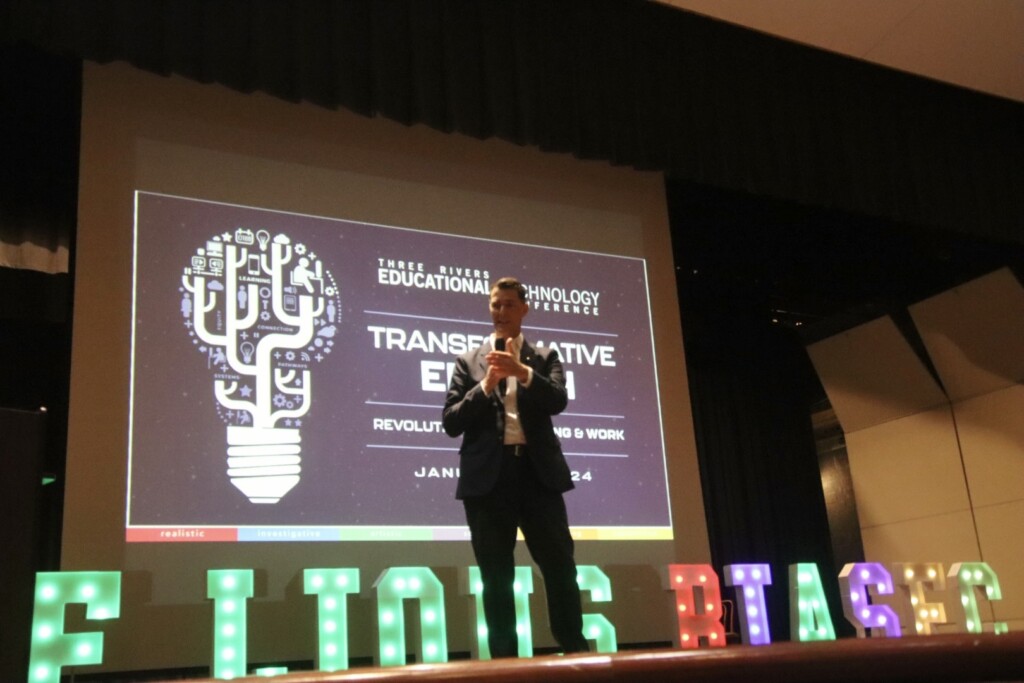
By: Norton Gusky
At this year’s TRETC Conference AI was on everyone’s mind. According to Bard, the AI tool from Google:
The Three Rivers Educational Technology Conference (TRETC) 2024, held in Pittsburgh on January 15th, was a transformative day for educators, administrators, and industry experts in Southwestern Pennsylvania. The theme, “Students are the future of our workforce,” resonated through sessions and workshops focused on harnessing EdTech to prepare students for careers in a rapidly evolving world.
Keynote speakers like Ed Hidalgo inspired attendees with innovative approaches to career development, while educators shared best practices for integrating technology into the classroom. The conference culminated in the Evening Innovation in Education Awards, celebrating outstanding advancements in educational technology. Overall, TRETC 2024 provided a valuable platform for collaboration, inspiration, and the exploration of transformative EdTech for a brighter future.
This summary is a good example of the strength and weakness of AI. For example: The conference did not “culminate” with the Innovation in Education Awards; the conference kicked off with the awards. However, Bard did a fine job providing a one paragraph summary.
My colleague, Rich Platt, decided to see how ChatGPT 4.0 with Bing access would summarize the event. ChatGPT 4 with Bing access performed a little better.
The Three Rivers Educational Technology Conference (TRETC) 2024, held at South Fayette High School on January 15, centered around the theme “Transformative EdTech”. This event offered a dynamic professional development opportunity for teachers, K-12 administrators, industry experts, and higher education decision-makers in South Western PA. It aimed to advance the integration of educational technology, fostering pathways for students to engage with “what is next” while in the classroom, thereby laying a strong foundation for their future careers.
Key highlights of the conference included:
1. Keynote Speaker: Ed Hidalgo, an expert in integrating career readiness into school culture and an advisor for various educational and non-profit organizations, shared insights based on his extensive experience in corporate HR, higher education, and K-12 public schools.
2. Featured Speakers:
– Joseph T. Yun, an AI architect and research professor, discussed AI/ML technologies and user-centric analytics systems.
– Amil Cook, a Hip-Hop Technologist & Strategic Partnership Consultant, spoke on empowering Black youth through technology, language, and cultural identity.
– Rachelle Dené Poth, an edtech consultant and teacher, shared her extensive knowledge in Spanish and STEAM education.
– Janet T. Phan, the founder of Thriving Elements, discussed empowering underrepresented girls in STEM through mentorship.
3. Additional Sessions and Events:
– Dr. Gary Stager presented on “Coding in the Age of AI”.
– An Early Innovation in Education Award & Networking Event was held prior to the conference, providing a platform for networking and recognizing innovative educational approaches.
– Optional two-day Teacher Training by World of Work Pittsburgh was available, focusing on practical training and classroom site visits.
Here’s a more complete summary using postings on X and LinkedIn from participants at TRETC plus my own observations as a key planner and workshop leader for the event. The variety of voices shows a key difference from AI which is flat and lacks a point of view.
On January 14 and 15th over 530 educators from more than 200 different entities sampled workshops, presentations, an eSports competition, panel discussions, featured speakers, an author’s fireside chat, award ceremonies, and a visit to a local Robotics factory. The Pittsburgh Technology Council sponsored the event that has become for more than 25 years the premier educational technology gathering for educators and educational leaders in the Pittsburgh region.
According to Matt Friedman, the Superintendent of the Quakertown School District outside of Philadelphia, “So amazing to have @EdHidalgoSD kicking off #TRETC2024 talking #RIASEC and thinking about student voice, student interest and common language to build a connection within your schools, district and community.”
“Unsurprisingly, AI took center stage in our discussions. Joseph T. Yun, Ph.D, one of the featured speakers, reminded us that AI is not just here; it’s here to stay and progressing faster than we might anticipate. His call to action resonated deeply — how can we empower students to be leaders in a world entwined with AI? Human leaders in a world with AI,” Katherine Rettura, the Director of Technology and Innovation for Teamology commented.
Marie Pelloni, the Coordinator of TRETC, invited onto the stage a team of K-2 students from South Fayette Primary School led by their STEAM teacher, Melissa Ungar. According to Marie, “This was one of my most favorite parts of the day. They gathered over 300 pieces of data coming out of the keynote. And … so fitting, and speak about their results. It was AWESOME.”
Like Katherine, I found everyone talking about AI. With my colleagues, Rich Platt, the Director of Technology for the Allegheny Intermediate Unit, and Ed McKaveney, the Director of Technology for the Hampton School District, we facilitated an Edtech Forum for Education Leaders. We shaped our session around CoSN’s Driving K-12 Innovation project for 2024, especially the Tech Enablers. When we divided the group into three working groups, AI became the common theme. Steve Ritter from Carnegie Learning joined me for a look at Adaptive Technologies and Analytics. Each group that joined us talked about AI in some fashion. We discussed some of the pros and cons, especially how AI can provide a tool to adapt to individual learners and provide opportunities for student agency. One group talked about using AI as a way to assess student prior knowledge. According to the group’s note-taker, “In addition to prior knowledge, learning is mediated by a host of other factors—motivation, engagement, teacher efficacy, contextual factors outside of school, etc. Meaningful learning occurs in the active integration of to-be-learned material with existing knowledge and experience. In other words, learning that is meaningful—worthwhile—is an active process (which assumes engagement, motivation, requisite prior knowledge and skills, and proper scaffolding).”
Tom Lauwers, the founder and CEO of Birdbrain Technologies, and Zee Poerio, the Technology and Latin teacher at St. Louise de Marillac School, shared in a session how the Finch Robot can be used to introduce students to AI. According to Tom, it’s critical that students understand the underlying principles behind AI or Machine Learning. Zee shared her experiences running the Finch activity in her classroom, as well as her students’ reactions to the activity. In the learning activity, students learn how to use image recognition software to program the Finch robot to respond to a prompt. Key to the project is Teachable Machine, a tool developed by Google a number of years ago. A modified version of the activity for Hour Code allows teachers to test it out even if they don’t have a Finch Robot.

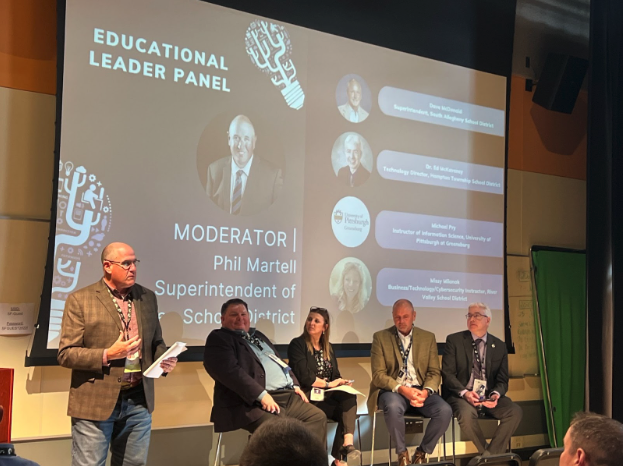
Phil Martell, the superintendent for the River Valley School District and the winner of the 2024 TRETC Leadership Award, moderated a panel discussion on Cybersecurity with experts that included a teacher – Ms. Melissa Milanak, superintendent – Dr. David McDonald, higher education instructor – Michael Pry, and director of technology – Dr. Ed McKaveney. According to one of the participants, The Panel for the Leaders in Cybersecurity Education Inside of K-12 Classrooms was excellent. At the end of the day, the goals are simple: Safety and Security.”
TRETC had a special track on the World of Work coordinated by Ashli Detweiler, the Regional Coordinator for a special project in the Pittsburgh region funded by the Grable Foundation. Pittsburgh – World of Work started as a cohort of four partnering school districts that include Avonworth, Duquesne City, Elizabeth Forward, and South Fayette Township. These four districts partnered together during the 22-23 school year where the focus for implementation fell in the grade bands of second through fifth grade. A common language around RIASEC was introduced and included in daily conversations and instructional delivery. Once students had an understanding of RIASEC and were able to make personal connections to each of the RIASEC themes, students were exposed to six careers in each grade level. As the cohort shifted into the second year of the pilot, all teachers in grades second through fifth grade were implementing what was created from the previous year. The work has grown from 11 classroom teachers in Year One to over 150 teachers in Year Two. As Pittsburgh – World of Work continues to grow, so do the partnering districts who want to be onboarded and supported.
TRETC was the kick-off for a two-day professional development with teachers, counselors, principals, Directors of Curriculum, and Superintendents. Participants were engaged from the start of the two-day learning experience as Ed Hidalgo led the session by showcasing how RIASEC can be introduced and incorporated into conversations with students. Unpacking the overview and resources of World of Work was shared with all participants as each person started to think about how this would look in their respective school districts. Team work time was offered as Detweiler, William Battistone (Avonworth Principal), Tom Kaminski (South Fayette Township Principal) and Kristen Johnson (South Fayette Township Assistant Principal) facilitated the work sessions and helped to guide the participants in a roll-out that made sense to each of them. The following day allowed the participants from TRETC to come to see World of Work in action in the Avonworth School District. Battistone utilized his building, staff and passion to continue to guide districts as they develop what World of Work can look like for each of them.
Liz Peek joined the WOW track to share her experiences with the Beable software. Liz related that a new career has been added to the @onet_center for Instructional Coaches, an SEC career, and accessed via Beable. According to Ed Hidalgo: “I think the benefit of Beable is personalized lessons, nonfiction, that connect student interests and RIASEC/reading at the students’ lexile level. Exploration is unlimited. And can be used in different approaches/integrations.”
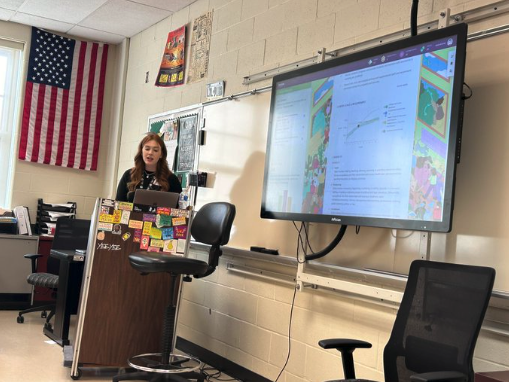
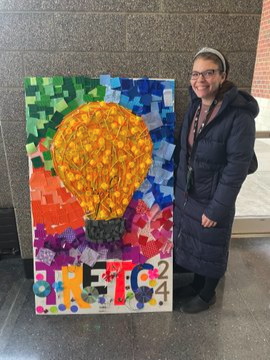
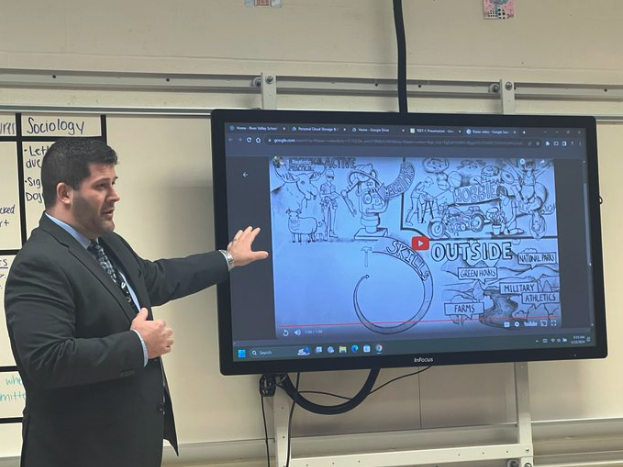
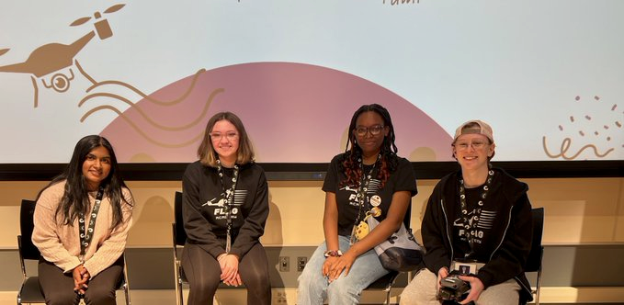
Another session for the WOW track was led by a team from the River Valley School District. According to an observer of the session, “Creating Career Interest and Exploration K-5 was well attended by a diverse group of educators and Tech Ed participants. Brian Higginbotham, Principal at Blairsville Elementary School, joined by River Valley elementary teachers Jessica Scardina and Stephanie Stroup, delivered strategies for integrating and embedding RIASEC language through a proven, methodical approach. Audience members gained a unique perspective on how to effectively harness student strengths, interests and values to develop career pathways as early as Kindergarten.”
TRETC had several opportunities for students to showcase their talents. Dr. Janeen Peretin, the Director of Communication, Innovation, and Advancement for the Baldwin-Whitehall School District, led a session with her student team around their award-winning Drone project. According to Janeen, “Feeling incredibly proud of our FLAG team as they soared at #TRETC24 today! These bright young minds are not just representing our program but also embody our vision for future-focused programs in our schools. Our Fly Like a Girl drone academy presentations were met with great enthusiasm, highlighting the growing interest in aviation in our region. We are incredibly grateful for the unwavering support from our partner districts and Remake Learning as it is only through a Moonshot Grant that we are able to take these bold steps toward a new future for learning. Looking ahead, we are excited to announce that applications for schools to join our second cohort are now open and can be accessed here: https://forms.gle/G8FimnW2RmnirYAXA.
For the first time, TRETC included an eSports competition. This year 5 high school teams joined the competition. The winners were from Trinity Area SD and the second-place team represented South Fayette SD.
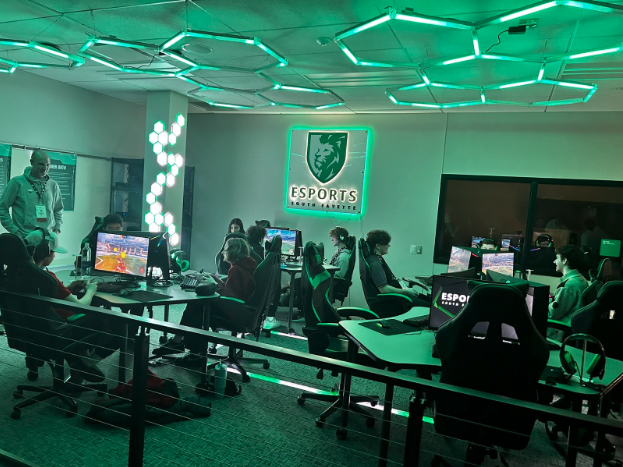
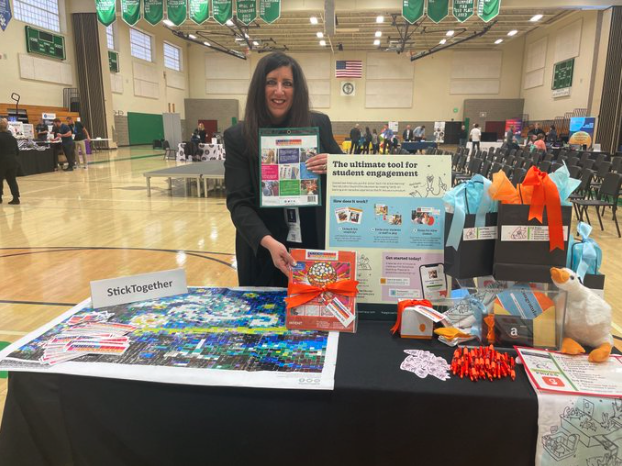
In addition to educators and students, TRETC this year had a great number of corporate and non-profit partners demonstrating their technologies as part of a vendor exhibit and an Innovation Zone.
Kashif Henderson, the Executive Director for the Neighborhood Learning Alliance in Pittsburgh, shared his thoughts about the impact of the conference, “The TRETC 2024 Conference was a great opportunity to highlight the innovative workforce development opportunities happening in the Pittsburgh region. The most rewarding aspect of the conference was being in a collaborative space with industry, out-of-school-time, and school leaders to brainstorm how we can work together as a collective to further this work beyond the conference. “
Katherine Rettura shared her reflections about the conference and the importance of connecting both in the classroom and in a conference like TRETC at the South Fayette Township School District:
“…I had the privilege to connect and reconnect with dedicated educators passionate about embracing technology and the dynamic innovations unfolding in education.
“Contemplating the prospect of students assuming leadership roles in a world with AI, the theme of connection emerges as a necessity. In a world where AI is ubiquitous, Ed Hidalgo emphasized the vital role of human connection. Connecting with students, and understanding their interests, values, and beliefs. Educators can amplify student learning by forging connections on a personal level, empowering them to recognize the value in their unique strengths and interests. Every RIASEC personality type, he highlighted, has a meaningful contribution to make.
“Recalling my classroom experiences, the magic unfolded when students connected, collaborated, and utilized their unique strengths to create, innovate, and learn together.”
Norton Gusky is an educational technology broker and uses technology to empower kids, educators and communities. You can find him on X at @ngusky.





0 Comments
Leave a Comment
Your email address will not be published. All fields are required.